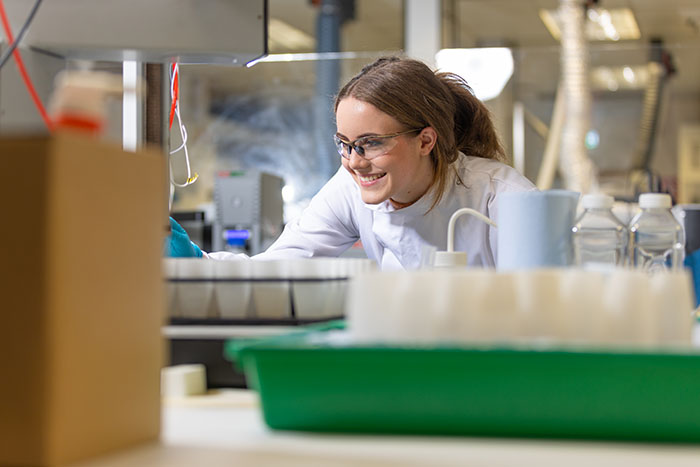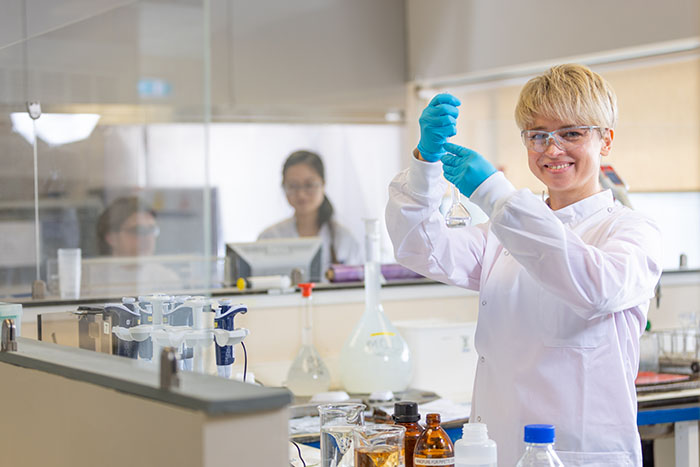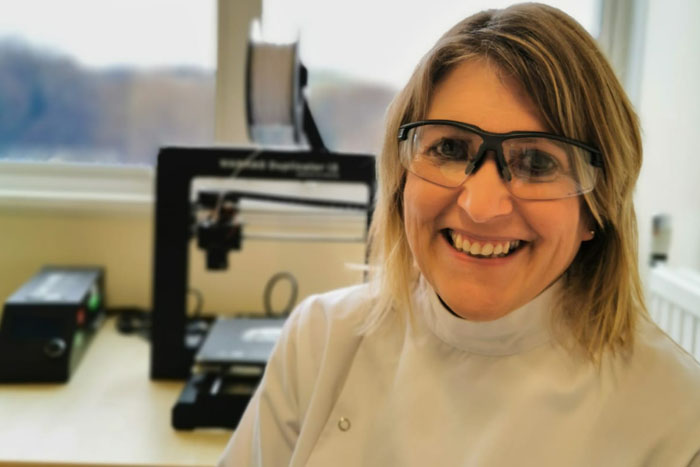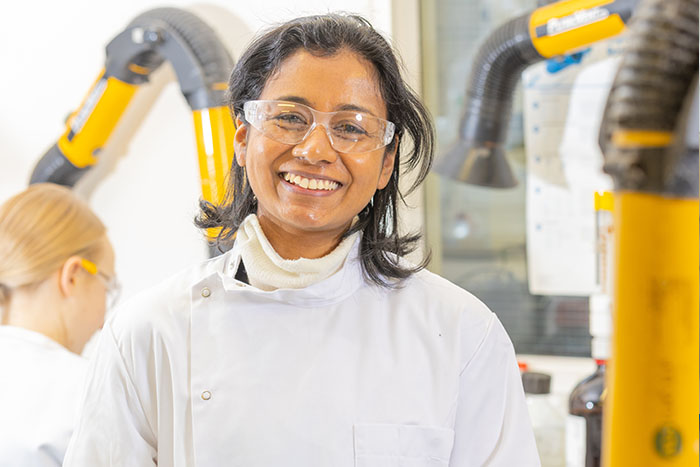Our labs make sure that the quality of the water across the South West is tip-top. Whether that water is in the enviornment or coming out of your tap. With over 1 million tests done per year (that’s over 2,700 per day!) our labs are extremely busy places to be, making sure that your water meets all the regulatory standards it needs to.
I was lucky enough to be able to chat with some of our lovely ladies who work in the labs to find out a bit more about what their job is and why it’s so important.
Let me introduce you to Claire, Lauren, Kasia and Naz.

Lauren is from Canada and is now a Chemistry Section Leader in the Inorganic Department. She helps to oversee the smooth running of her team of 20 scientists, everything from making rotas, troubleshooting strange results, and helping progression and training.

Kasia is from Poland and is now a Chemistry Manager and manages Organic, Inorganic and also Radiochemistry Teams. She works hard to make sure that the quality of the results they report is always as high as they can be. Planning for the future and introducing new methods and instruments is also part of her job.

Claire is local and the Laboratory Manager. She’s worked her way through the lab for the past 32 years. She uses the data collected by the others to promote investment in new methods or equipment. “I need to make sure we have the right balance between chemists and microbiologists, people working at the bench, and you know, that they’ve got the tools they need to do the job that they’ve got to do day-to-day.”

Naz is from Sri Lanka and is the newest member of staff, having joined the company a couple of months ago as an Apprentice Laboratory Data Scientist. She monitors the quality of the data that’s generated by the laboratory, handling massive data sets, and is able to convert them into useable, easy-to-read reports. Without her, the data wouldn’t make as much sense!
What is the Inorganic Department, what does that involve?
Lauren:
The main three sections of the lab would be Microbiology who look for microscopic organisms - viruses, bacteria, algae, fungi, and protozoa in water. Then you have Organics who look for organic compounds, so pesticides, herbicides and all those sorts. Then the Inorganic department is all the remaining, non-carbon based subsets of compounds, for example lead and other metals that you wouldn’t want in your water.
Kasia:
We also look at pH of water, conductivity, colour, and turbidity. And radiochemistry.
What is Radiochemistry?
Kasia:
It’s chemistry of radioactive materials. We analyse for alpha-beta radiation, tritium, radon, and radium.
Claire:
It’s not quite as scary as it sounds. Living in the South West, the geology of the South West means that we have more of this naturally occurring radioactivity than in other parts of the country.
Kasia:
The main source of that radiation in the South West is granite. Granite contains uranium which transforms to other unstable isotopes in a decay chain until eventually a stable isotope is reached.
What is an interesting fact/something you’ve learnt doing the job that you didn’t know before?
Claire:
The water that comes through the tap isn’t sterile, you know, because it’s come through a pipeline. But the microbiological standards that we need to have for the tap water is much higher than the standards needed for bottled water in the supermarket.
Lauren:
I mean, I didn’t know anything about water testing before I worked here. I just took it fully for granted. Didn’t think about it. But yeah, I think what I’ve learnt is actually just how much work goes into keeping water at the standard at which people are used to. It’s a huge number of scientists and people involved in keeping the water safe and proving that it’s safe with testing.
Claire:
The large treatment works are tested 365 days a year. Christmas Day, someone will be in the laboratory testing the water. A sampler will go out there and take a sample and bring it to the laboratory and we will test if that water’s fit for consumption.
Kasia:
I think for me it’s actually how clean the waters, at least in the South West are. I’m talking about raw water – the rivers, and reservoirs, you know. Thinking about farming and use of pesticides, you actually very rarely find anything in the raw samples. You don’t find that in Europe. I definitely wouldn’t drink anything that flows through my home town.
Claire:
This links to our Upstream Thinking. We’ve worked with farmers to stop those contaminants getting into the water supply. You know, cryptosporidium, if you stop your cattle drinking from the rivers, you stop that getting into the river.
Naz:
I found it quite interesting how much effort goes into our water. I never knew there would be routine testing or anything like that. I never thought of it in that way. In Sri Lanka I was doing Electrical Design Engineering.
What’s your favourite/funniest/happiest/proudest moment in the lab?
Claire:
We were the first people in South West Water to recruit someone with Down Syndrome, so I’ll go with recruiting Alix as the proudest moment. She’s a really happy and lovely soul and makes a real positive impact with everyone she comes into contact with.
Kasia:
My proudest was watching how - especially during the pandemic - how the junior analysts who had started just before, how quickly they matured and adapted and responded to the challenge. How positive they all were. And there were a few people that, before the pandemic, were maybe shy, maybe they had doubts about whether they were good enough, and then suddenly they just stepped up and it was wonderful to watch them. That was a very proud moment to see.
Laruen:
I think it’s really important to be a role model, especially for little girls so they can see themselves in STEM roles in the future. So, I’ve been a STEM ambassador since I joined the lab. I signed up as soon as I could. I go around to classrooms and run little experiments with the kids so they can get a hands-on feel for what it’s like to do science and get excited by STEM thinking. I’m definitely proud of that, and seeing their faces light up. I’ve done a couple of tours for teachers and students around the lab and they always seem quite amazed by a lot of our kit which is always fun.
Naz:
I’m quite prideful about what I do because I help people to have clean water and to protect the environment.
Kasia:
We had one unusual request from a customer. Someone phoned the labs to say that their duck died and they thought it was something in the water that killed it. My colleague, Ian, asked them to bring in a sample for analysis, thinking it would be a sample of water from the pond. They were supposed to drop it off and leave it in the fridge. When Ian opened the fridge in the morning, he found a plastic bag containing a dead duck. The duck had a broken neck and looked like a fox had bitten its head off. Ian, inspected the duck and said, “I don’t know of any chemical that would do that to a duck!” And besides, we don’t do duck analysis in our lab.
How does it feel to be working in a typically male dominated environment?
Claire:
The management team at the lab is actually female dominated now. Just the best people got the job, what can I say? Yeah, the lab isn’t male dominated now, but it was when I started, particularly in Chemistry. I’ve never felt, you know, through the whole of my career with South West Water, I’ve never actually felt disadvantaged by being a woman. You know, I’ve had children, worked part-time for a little while and I’ve always felt well supported in the laboratory.
Kasia:
I’ve always felt very supported and encouraged to progress in science at the labs. Even though I could have been disadvantaged due to my gender and nationality, I don’t feel like I have ever been held back.
Lauren:
I feel incredibly lucky in my whole life. I feel like I’ve won the role-model lottery – my mum’s a scientist, my aunts. I’ve never had trouble picturing myself in this kind of role. And I have felt continuously lucky going into this job because I didn’t expect to have such incredible female mentors. And it’s been really good to have female mentors in my early career.
Naz:
Engineering used to be a male dominated field in Sri Lanka and there weren’t many encouragement programmes focusing women. When I joined South West Water, I was quite amazed and happy to see the large number of women in managerial positions. So in that sense I think the UK is in a much better place when it comes to equal opportunities and women have more freedom and encouragement.
Claire:
I mean, maybe I’m old fashioned in that I still think there are differences between men and women and that should be celebrated as a positive thing. I can think of lots of times that I’ve been asked by my male colleagues who are struggling with a situation, and they’ll ask me, and I feel that sometimes part of the reason their asking me is because I’m a woman. In a positive way. They’re asking me because they want a different perspective and they value my opinion.
Kasia:
Yeah, we definitely have different strengths and it’s good to have a mixture of both. And use it.
For further information please contact:
To find out more about careers with us, please click here.